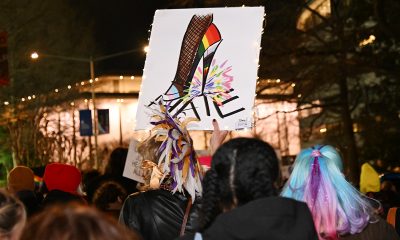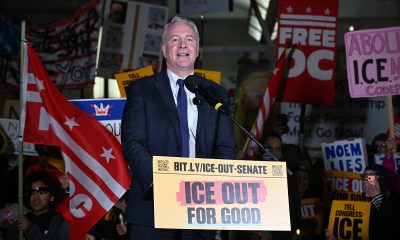a&e features
Out classical pianist Hough promotes new essay collection
Practicing, recording, concertizing and more considered in pithy book ‘Rough Ideas’
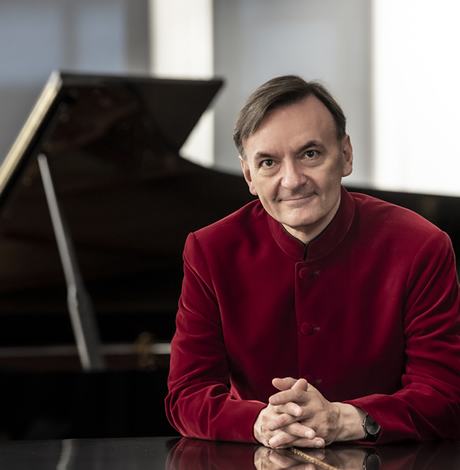
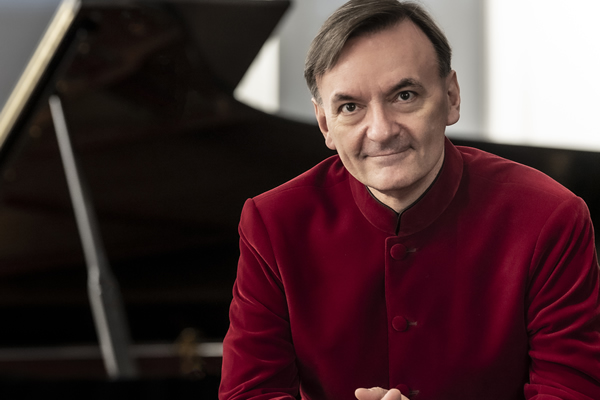
Many classical musicians eschew talking about their personal lives. With little public interest in who’s having sex with whom a la Hollywood, pianists, conductors, violinists and the like can often get along without ever having to get into talking about sex or romance.
The gay British pianist Stephen Hough (pronounced “huff”), however, is not shy about such topics. In his new essay collection “Rough Ideas,” (published Feb. 4 by Farrar, Straus and Giroux in the U.S.) he explores the question of the antiquated phrase, “Is he musical?,” as a euphemism for homosexuality in an age when it was “the love that dare not speak its name.”
He darts around all sorts of topics in short essays such as “Gay pianists: can you tell?,” “Can atonal music make you cry?,” “Is New Age thinking bad for musicians?,” “Authentically playing Rachmaninoff” and dozens more.
In 2018, his debut novel “The Final Retreat,” which he says is full of “very raw sexuality,” explored the gay longings of a middle-aged Catholic priest in seclusion.
All that to say, Hough, 58, is not at all stuffy and balks at no topic. He was slated to be here in mid-April to play a Beethoven piano concerto with the National Symphony Orchestra and present his book at Politics & Prose. That, of course, has been canceled but he was still game to carry on with a previously scheduled Blade interview on March 23.
Hunkered down at his home in central London where he lives with Dennis, his partner of 18 years, Hough was friendly and loquacious waiting out COVID-19. His comments have been edited for length.
WASHINGTON BLADE: How are things in London?
STEPHEN HOUGH: Well this is something you couldn’t have imagined really with everything shutting down the way it has. I was in New York with 9-11 and you know, it was an absolute lifesaver for me being together with friends and now, of course, you can’t do that. You can’t seek that human comfort, so that makes ths really very different. … I think when we come back to normality, we will treasure these things so much.
BLADE: How has it been for you?
HOUGH: Well, it’s two-fold. My concert diary for the next few months has been wiped clean. I get on the computer and it’s all gone blank, all the travel that was planned for concerts. There’s one for China, ironically, that’s still on for June, I don’t know whether or not that will still happen. … But there’s a positive side to it too. As a pianist, you spend most of your life alone practicing so that’s been the same. I think I’ve been more calm because I haven’t had to worry about whether this piece is ready, I’ve got to leave for the airport tomorrow … all those concerns are gone, which is really wonderful. Of course it’s only been a week. Maybe ask me again in a month the same question.
BLADE: What’s the mood like in your neighborhood?
HOUGH: Well, it’s never been this quiet even on Christmas morning. There are very few cars around, nobody is on the streets. … It’s something people haven’t felt since the Soviet Russian times and that’s scary.
BLADE: Do you know anyone who’s succumbed?
HOUGH: No but it’s funny — my partner and I were in Taiwan for Christmas and we came back just before the new year and he thinks he may have had a mild for of it, but that was in early January so we just thought it was the flu.
BLADE: Has your practice had more clarity? Are you more focused?
HOUGH: I think it’s been more concentrated and more joyful. I’ve been practicing some Schubert sonatas and I’ve been overwhelmed by how beautiful the music is. I wouldn’t say in a way that I’ve never felt before, but there’s a purity to it, much like the air in our city. Because there are so few cars around, London feels very fresh and it’s spring.
BLADE: I would be tempted to get lazy. Have you?
HOUGH: So far it’s been OK. I have some writing deadlines for three compositions that I took last year. At first I was thinking I’d have to kill myself to get them done, but now I can do them without having to worry too much. When I’m on holiday, I find it very easy to do literally nothing all day except just read, eat, sleep, repeat.
BLADE: How do you generally know how much to agree to professionally?
HOUGH: It’s very difficult to know if yo’ve got that right. I’m very careful about not dong things at the last minute. When you’re 21, 22 and just starting ot, you say yes to everything because you never know who will ask again. But you come to a point where you take stock a bit and realize you need enough time to prepare a piece. Not just to be able to play it from memory, but truly inhabit it, like an actor with a role in a play.
BLADE: What feedback have you heard so far on “Rough Ideas”?
HOUGH: We’ve had some very nice responses from both people who are musicians and people who have no knowledge of music at all, so it’s very gratifying when that comes back. … This is a book you can give your grandmother, unlike my novel, which was quite different and came out the year before about a priest who’s being blackmailed by a male prostitute.
BLADE: Wow, sounds scandalous.
HOUGH: It’s very scandalous. …. My partner said, “You can’t publish this under your name,” but I said, “No, I’m going to own this book.” It was a topic I’d been wanting to explore — how do you continue to bring comfort to people if you’re a priest and you’ve completely lost your faith?
BLADE: Are you still a practicing Catholic?
HOUGH: I go to Mass but I don’t take communion. I just don’t feel I’m part of it enough to feel good about that, but it’s still a very central part of my life. The teachings — it’s not just about the rich and powerful, but also the widow and the orphan — there’s a wisdom there that very much makes sense to me.
BLADE: How musically sophisticated are Catholics today vs. historically?
HOUGH: I think it’s a very small number. We think about Catholic culture being so great but it was only in the big cathedrals where you might have a Mozart or a Palestrina. In the small parish churches, the music has never been that particularly distinguished. I think the Anglican church has had more of a musical life. There are lots of great cultural things in Catholicism but they were not always very spread out.
BLADE: How did you wind up being a British Catholic?
HOUGH: I converted when I was about 18. I’d grown up in a more evangelical background but I got very bored with those services. … I went to a Mass and there was something about it that appealed to me very deeply. I even explored becoming a priest a few times although I don’t think they’d take me anymore.
BLADE: Whom do you see as the audience for “Rough Ideas”?
HOUGH: Well I hope everyone really, but certainly everyone who has any interest in music and the piano. There’s a lot of stuff in there I think will be helpful and interesting to piano students.
BLADE: Did your views evolve at all as you got them down on paper?
HOUGH: Yes, but I can’t remember now which ones that would be true of. One of the longest essay in there, which was published in a different form in another book of gay essays is about what it means to be Catholic and gay. … I think that one forced me to think though some tough issues.
BLADE: Why, as you touch on in the book, are young people in Asia so much more into classical concerts than elsewhere?
HOUGH: I think it must have to do with parents with the encouragement that kids get at home. Sometimes even being forced into lessons. I think it’s linked to why Asian kids so often do so well at school and university. It’s that support they have. You to to Korea or Taiwan or China and half the audience is under the age of 25. It’s incredible and wonderful. I have a couple of students at Juiliard and it’s interesting to see the lists of the people who get through and the people who don’t. I would say we’re talking 70-80 percent Asian. There’s something very touching about these countries where 200 years ago you wouldn’t have heard a note of Beethoven when he was writing, now they’re playing Beethoven better than the cultures in which it was written.
BLADE: Do you feel things are being dumbed down in the West overall?
HOUGH: Well yes, I think it’s happening everywhere … but I think there’s room for all kinds of music. I’m very uncomfortable with snobbishness in classical music.
BLADE: Yes, but it feels like it’s encroaching on space previously inhabited by the classical arts. You never just see a classical pianist on the Grammy Awards like you used to. If you do, they put Lang Lang with Metallica for some ridiculous stunt casting novelty thing. The Kennedy Center Honors will have one token honoree each year from the fine arts and the rest have become these middling, ’70s popular acts. Doesn’t stuff like this bother you? Again, not saying there’s anything wrong with the popular acts, but they’re encroaching on serious artists.
HOUGH: Well yes, it would be nice if these organizations would support and encourage the classical arts a bit more. I think the Grammys could do more to put some focus on the classical categories without losing anything of what they are.
BLADE: What do you think of the classical crossover acts?
HOUGH: Well, some are better than others.
BLADE: But what does it say about us that the public has such a voracious appetite for this junk while the serious acts will sell just a fraction of what they sell?
HOUGH: I think when you’re a kid, you need to be encouraged and hsown the way a bit and that’s something that’s happening less today in education. We have to find a way to educate people and bring them into this world and let them know this is great music worth making the effort for. On one hand, it doesn’t bother me. I’ve got friends who have no interest in music just as I have no interest in sports. We shouldn’t make people do things or suggest there’s anything wrong with them. … But it’s OK to entice people a bit to enjoy, say, a fine wine when they’ve been drinking something that’s really cheap and nasty. Some of it is about changing the palate. Some of that happens as we mature. Your tastes are usually different at 40 than they were at 20 but we typically need a bit of encouragement for things that are more difficult and classical music can sometimes be difficult. You might have to sit there for an hour vs. listening to a three-minute pop song.
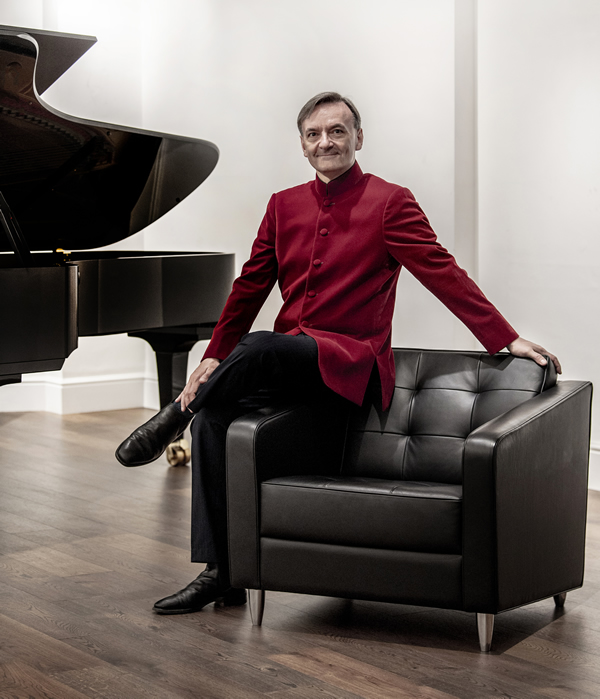
a&e features
Visible and unapologetic: MAL brings the kink this weekend
Busy lineup includes dances, pups, super heroes, and more
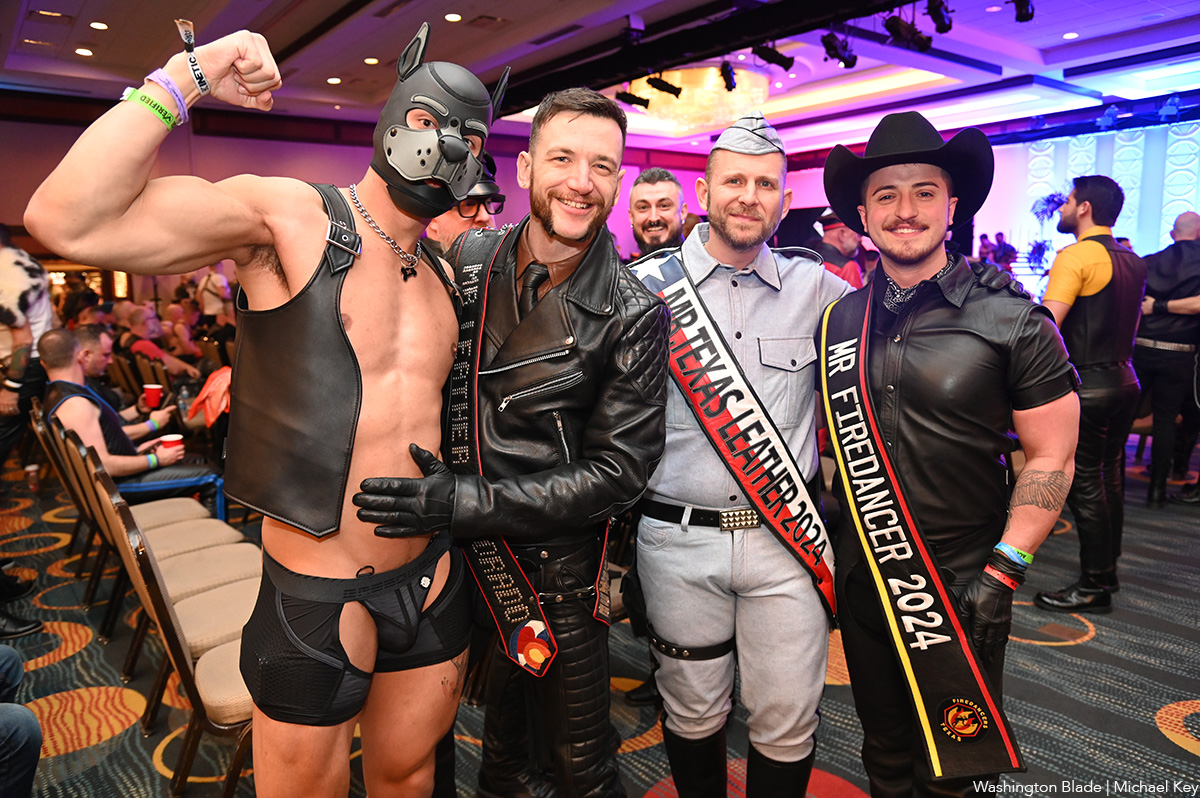
MLK Weekend in D.C. brings the annual Mid-Atlantic Leather (MAL) Weekend. Just a short walk from where Congress has been attacking queer Americans this year, MAL takes place at the Hyatt Regency Washington for several days of intrigue, excitement, leather, and kink.
The Centaur Motorcycle Club — one of several similar groups dedicated to leather in the country — has been hosting MAL in its current form for more than 40 years. Originally a small gathering of like-minded people interested in the leather lifestyle, MAL has grown to include a full four days of events, taking place onsite at the Hyatt Regency Washington (400 New Jersey Ave., N.W.). Select partner happenings take place each night, and many more non-affiliated events are scattered across the DMV in honor of and inspired by MAL.
MAL Weekend has become an internationally renowned event that celebrates fetish culture, yet it also raises funds for LGBTQ organizations, “reinforcing its legacy as both a cultural and philanthropic cornerstone of the global leather community,” according to MAL organizers.
During the day, MAL events at the Hyatt include workshops, social gatherings, shopping, and other in-person engagements for the community.
“The Hyatt underwent an extensive top to bottom renovation after last year’s event,” says Jeffrey LeGrand-Douglass, the event chair. The lobby, meeting spaces, guest rooms, and other areas have been updated, he notes, “so I am very excited for our guests to experience the new design and layout for the first time. And of course as with every year, we look forward to the contest on Sunday afternoon and seeing who will become our new Mr. MAL.”
In the evening, MAL hands the reins to partner KINETIC Presents, the D.C.-based nightlife production company. KINETIC will host four consecutive nights of high-production events that fuse cutting-edge music, immersive environments, and performance. This year, KINETIC is popping open doors to new-to-MAL venues, international collabs, play zones, and a diverse lineup.
According to KINETIC managing partner Zach Renovátes, 2026 is the most extensive MAL production to date. “The talent lineup is unreal: an all-star roster of international DJs, plus drag superstar performances at the Saturday main event,” he says.
Renovátes added that he’s “most excited about the collaborations happening all weekend — from bringing in MACHO from WE Party Madrid, to teaming up with local leather groups, to nonprofit partners, and Masc Diva [a queer nightlife collective].”
Official MAL events begin on Thursday with the Full Package/Three Day Pass Pick-Up from 5:30-8:30 p.m. at the Hyatt.
Thursday night is also the KINETIC kickoff party, called LUST. Running 10 p.m. – 3 a.m., it’s being held at District Eagle. DJ Jay Garcia holds it down on the first floor, while DJ Mitch Ferrino spins in the expansive upstairs. LUST features special performances from the performers including Serg Shepard, Arrow, Chase, and Masterpiece.
Renovátes notes that the LUST opening party at District Eagle coincides with the bar’s grand re-opening weekend. The bar will unveil its new permanent home on the renovated second floor. “it felt like the perfect place to start Mid-Atlantic Leather weekend — right in D.C.’s only dedicated home for kink communities,” he says.
After Thursday night, Friday is when daytime events begin at the Hyatt. The Exhibit Hall, on the ballroom level below the lobby, hosts upwards of 30 vendors, exhibitors, and booths with leather goods, fetish wear, clothes, toys, other accessories, providing hours of time to shop and connect with attendees and business owners. The Exhibit Hall will be open on Friday from 4-10 p.m., as well as on Saturday and Sunday afternoons.
DC Health is once again back at MAL, to provide preventative health services. In the past, DC Health has provided MPox vaccines, Doxy PEP, HIV testing, Narcan kits, and fentanyl test strips. This booth will be open on Friday 4-10 p.m.
Later, at 6 p.m., the Centaur MC is holding its welcome reception on the ballroom floor. After the Centaur’s Welcome Reception, the MIR Rubber Social is 8-11 p.m. A Recovery Meeting is scheduled at 10 p.m.
Many attendees enjoy visiting the guest room levels of the hotel. Note that to get in an elevator up to a hotel room, a staff member will check for a hotel room wristband. Non-registered guests can only access host hotel rooms if they are escorted by a registered guest with a valid wristband. Registered guests are permitted to escort only one non-registered guest at a time. Non-registered guests with a wristband who are already in the hotel before 10 p.m. may remain until midnight. However, non-registered guests without a wristband will not be admitted after registration closes.
Friday night, for the first time, KINETIC Presents is joining forces with WE Party to bring MACHO to Washington, D.C. This official MAL Friday event delivers two stages and two genres. On the UNCUT XXL stage, international Brazilian circuit superstars Erik Vilar and Anne Louise bring their signature high-energy sound. On the MACHO stage, Madrid’s Charly is joined by Chicago’s tech-house force, Karsten Sollors, for a blend of techno and tech house. UNCUT also features the XL Play Zone, a massive, immersive space exclusive to this event. The party takes place at the Berhta space from 10 p.m.-4 a.m..
“This year we’re bringing back the two-room format we debuted at WorldPride for both Friday and Saturday, so attendees can really tailor their experience — whether they’re in the mood for circuit or tech house.” says Renovátes.
Directly after Friday’s UNCUT XXL, UNDERWORLD Afters takes over District Eagle, from 3:30-8 a.m. International DJ Eliad Cohen commands the music.
Saturday, the Exhibit Hall opens earlier, at 11 a.m.. DC Health will also be back from 11 a.m. to 6 p.m.
Saturday is also time for one of the most anticipated events, the Puppy Mosh, running from 11 a.m. to 1 p.m. During the event, pup culture comes to life, when pups, handlers, and friends can enjoy an inclusive, safe pup zone. There is also a Recovery Meeting at 11 a.m., and the IML Judges Announcement takes place at noon.
The popular Super Hero Meet Up will be held 1:30 p.m. – 3 p.m., sponsored by One Magical Weekend, for cosplayers, comic enthusiasts, and their friends.
From 2-6 p.m., the Onyx Fashion Show will take place to showcase and highlight people of color in leather.
Finally, the Leather Cocktail Party – the original event of MAL – will be held 7-9 p.m. in the Ballroom. While this requires special tickets to attend, at 9 p.m. is the MAL cocktail party, which is open to wider attendees.
The last event of Saturday leaves the hotel, again a partnership with KINETIC. Kicking off at 10 p.m. and running until 4 a.m., it’s just the second time that KINETIC’s Saturday night party is an official MAL event and serves as the main weekend engagement.
Saturday night’s centerpiece is called KINK: Double Trouble. The night will feature a first-ever back-to-back set from international electronic music icons Nina Flowers and Alex Acosta on the Circuit/Tribal Stage. The other room – the Tech House Stage – curated by The Carry Nation and Rose, provides a darker, underground counterpoint, reinforcing the event’s musical depth and edge.
Beyond the DJs, KINETIC has called in the big shots for this party: “RuPaul’s Drag Race” legends Nymphia Wind and Plastique Tiara are set to headline. The party also takes place at Berhta.
Sunday, back at the hotel, there will be another Recovery Meeting at 10 a.m., and the Exhibit Hall opens again from 11 a.m.-5 p.m.
At 1 p.m., the anticipated and prestigious Mr. MAL Contest that celebrates the achievements of the leather community will be held in the Ballroom. This highly sought after title gives one man the power to become the Mid-Atlantic Leather man of the year. Sash and title winners must be (1) male, (2), a resident of North America, (3) At least 21 years of age; and (4) self-identify as gay. The first Mr. MAL was crowned in 1985. The Winner of Mr. MAL has the privilege of later competing in International Mr. Leather (IML) in Chicago on Memorial Day Weekend 2025.
From 4 p.m. to 12 a.m., MAL will hold its Game Night for the gaymers in attendance. There will also be a special screening of A24’s new film, “Pillion,” about a man who is swept off his feet when an enigmatic, impossibly handsome biker takes him on as his submissive.
Sunday closes with a community partner event produced by Masc Diva, featuring Horse Meat Disco with support from Coach Chris, at A.I. Warehouse in the Union Market district. It’s the same team that produced HMD during WorldPride at A.I. Warehouse.
Note that there are several types of passes for attendance to the hotel and parties. KINK VIP Weekend Passes include express entry, VIP areas, and enhanced amenities throughout the weekend, while MAL Full Weekend Package holders receive access to the official Sunday closing event.
At last year’s MAL events, KINETIC Presents raised more $150,000 for LGBTQ charities, and expects to match or exceed that impact in 2026.
Renovátes stated that “now more than ever, it’s important to create safe, affirming spaces for our community — but it’s just as important to be visible and unapologetic. We want to make it clear that the LGBTQ+ and leather communities aren’t going anywhere. We’ve fought too long and too hard to ever feel like we have to shrink ourselves again, no matter what the political climate looks like.”
In addition to the KINETIC events, various LGBTQ bars will hold parties celebrating the theme of the weekend. For example, Kiki, located on U Street NW, is hosting a party called KINKI, hosted by DJ Dez, on Saturday night. Sister bar Shakiki, on 9th Street NW, is hosting a party called Railed Out, a fetish-inspired party that features a play zone, on Thursday night. Flash, on U Street NW, will hold its infamous Flashy Sunday party to close out the weekend.
a&e features
Queer highlights of the 2026 Critics Choice Awards: Aunt Gladys, that ‘Heated Rivalry’ shoutout and more
Amy Madigan’s win in the supporting actress category puts her in serious contention to win the Oscar for ‘Weapons’
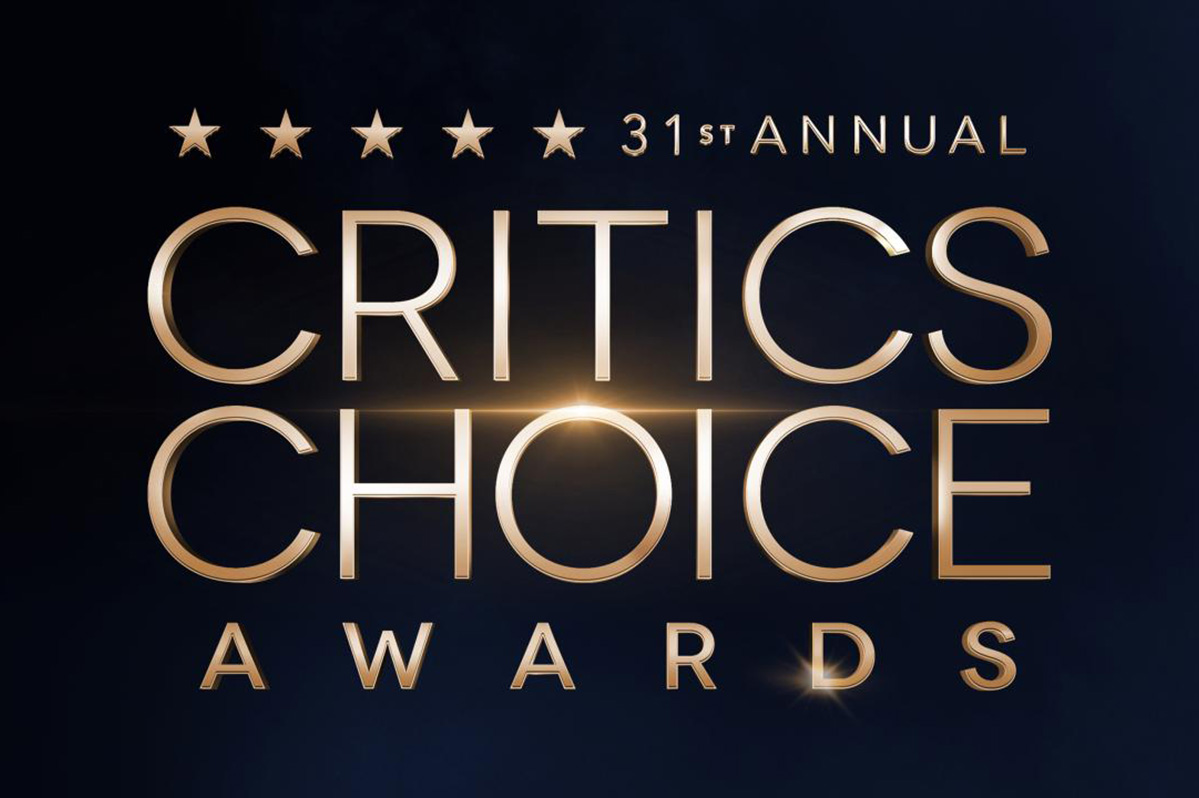
From Chelsea Handler shouting out Heated Rivalry in her opening monologue to Amy Madigan proving that horror performances can (and should) be taken seriously, the Critics Choice Awards provided plenty of iconic moments for queer movie fans to celebrate on the long road to Oscar night.
Handler kicked off the ceremony by recapping the biggest moments in pop culture last year, from Wicked: For Good to Sinners. She also made room to joke about the surprise hit TV sensation on everyone’s minds: “Shoutout to Heated Rivalry. Everyone loves it! Gay men love it, women love it, straight men who say they aren’t gay but work out at Equinox love it!”
The back-to-back wins for Jacob Elordi in Frankenstein and Amy Madigan in Weapons are notable, given the horror bias that awards voters typically have. Aunt Gladys instantly became a pop culture phenomenon within the LGBTQ+ community when Zach Cregger’s hit horror comedy released in August, but the thought that Madigan could be a serious awards contender for such a fun, out-there performance seemed improbable to most months ago. Now, considering the sheer amount of critics’ attention she’s received over the past month, there’s no denying she’s in the running for the Oscar.
“I really wasn’t expecting all of this because I thought people would like the movie, and I thought people would dig Gladys, but you love Gladys! I mean, it’s crazy,” Madigan said during her acceptance speech. “I get [sent] makeup tutorials and paintings. I even got one weird thing about how she’s a sex icon also, which I didn’t go too deep into that one.”
Over on the TV side, Rhea Seehorn won in the incredibly competitive best actress in a drama series category for her acclaimed performance as Carol in Pluribus, beating out the likes of Emmy winner Britt Lower for Severance, Carrie Coon for The White Lotus, and Bella Ramsey for The Last of Us. Pluribus, which was created by Breaking Bad’s showrunner Vince Gilligan, has been celebrated by audiences for its rich exploration of queer trauma and conversion therapy.
Jean Smart was Hack’s only win of the night, as Hannah Einbinder couldn’t repeat her Emmy victory in the supporting actress in a comedy series category against Janelle James, who nabbed a trophy for Abbott Elementary. Hacks lost the best comedy series award to The Studio, as it did at the Emmys in September. And in the limited series category, Erin Doherty repeated her Emmy success in supporting actress, joining in yet another Adolescence awards sweep.
As Oscar fans speculate on what these Critics Choice wins mean for future ceremonies, we have next week’s Golden Globes ceremony to look forward to on Jan. 11.
a&e features
Looking back at the 10 biggest A&E stories of 2025
‘Wicked,’ Lady Gaga’s new era, ‘Sexy’ Bailey and more
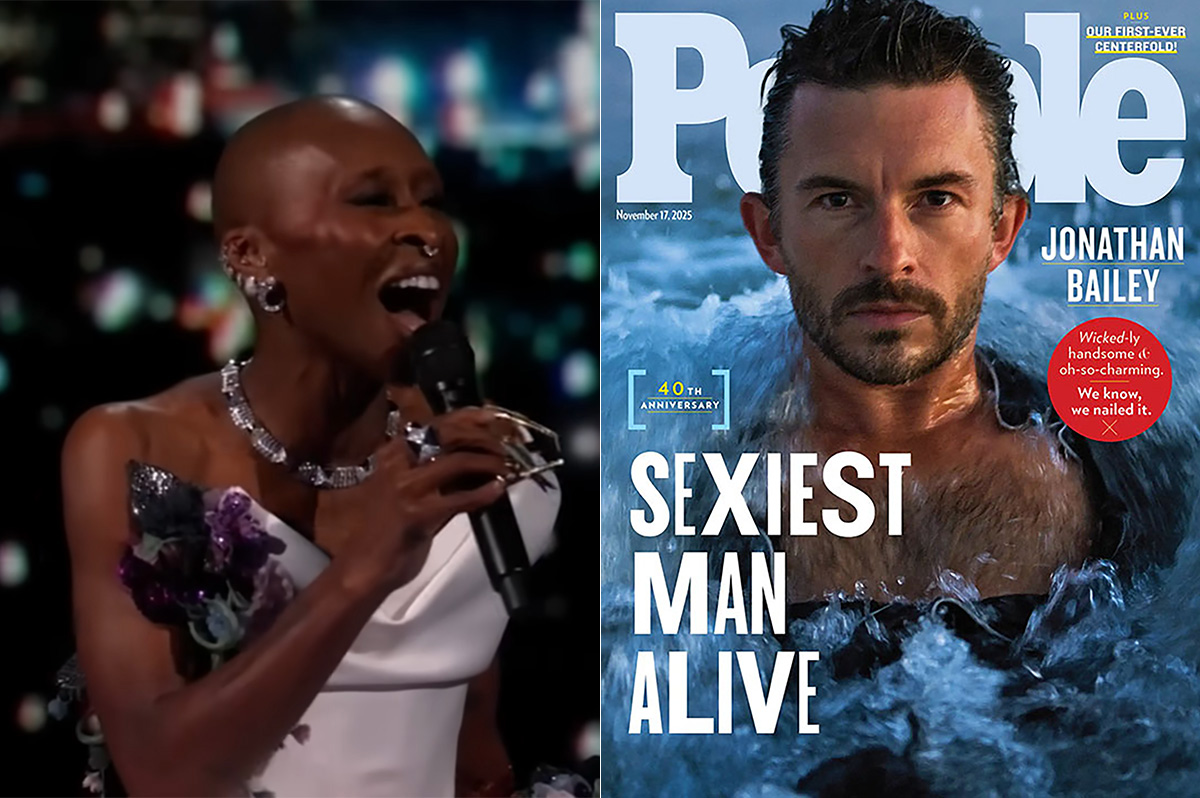
Although 2025 was a year marked by countless attacks on trans rights and political setbacks, the year also saw brilliant queer artists continuing to create art. From Cannes and Sundance Award winners now vying for Oscar consideration to pop icons entering new stages of their careers, queer people persevered to tell their stories through different media.
With the state of the world so uncertain, perhaps there’s no more vital time to celebrate our wins, as seen through some of this year’s top pop culture moments. While there’s no collection of 10 stories that fully encompass “the most important” news, here are some events that got the gays going:
10. ‘Mysterious Gaze of the Flamingo’ wins big at Cannes
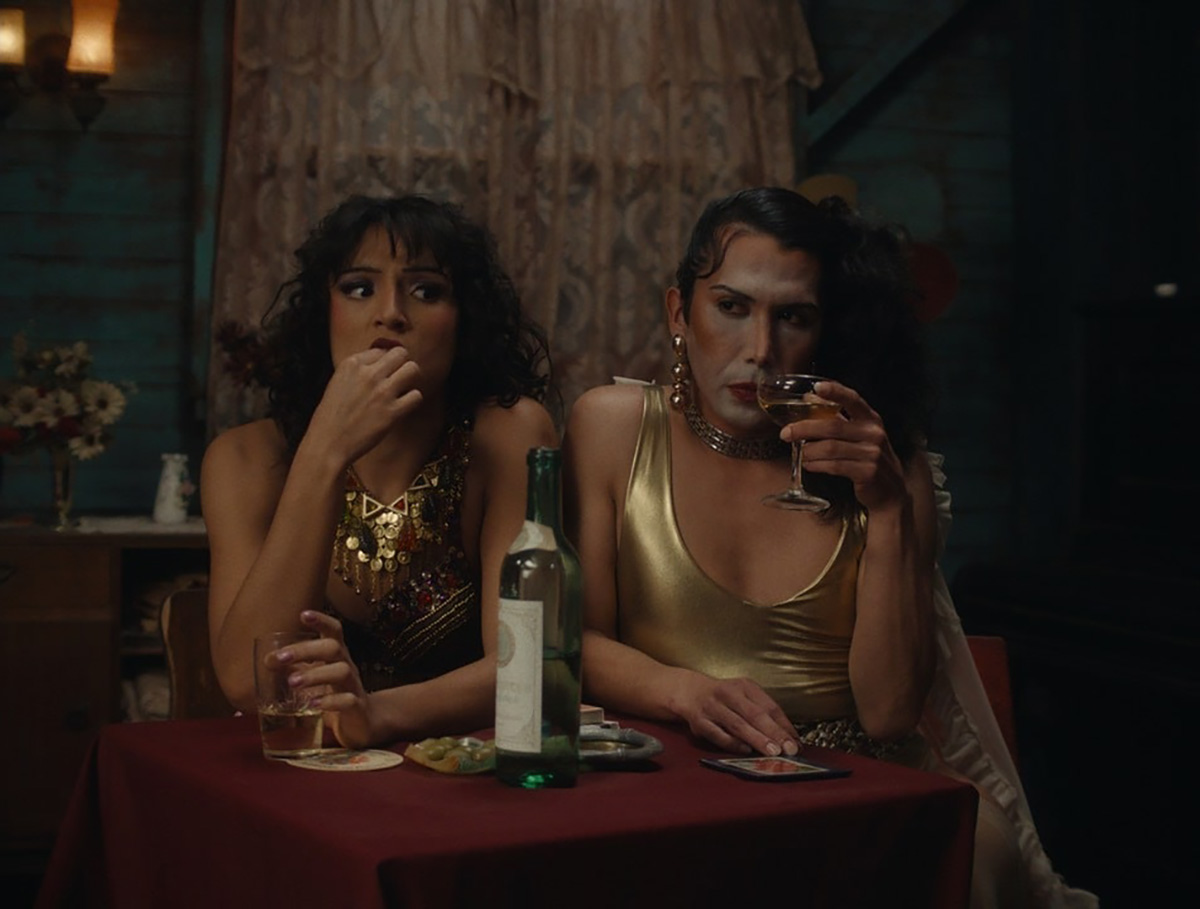
The Cannes Film Festival has become a crucial start for films hoping to make their way to the Oscars, and first-time director Diego Céspedes won the top Un Certain Regard prize for his intimate western “The Mysterious Gaze of the Flamingo.” The film is set in the ‘80s and is intended as an allegory for the AIDS epidemic. Seeing a film that unpacks vital queer history win one of the most coveted awards at Cannes has been a huge point of pride in the independent filmmaking community.
Since the film bowed at Cannes, it has been selected as Chile’s Oscar entry in the Best International Feature race. Speaking with The Blade during the film’s AFI Fest run in October, Céspedes said: At first, I was kind of scared to have this campaign position in the times that we’re living [in] here. But at the same time, I think the Oscars mean a huge platform — a huge platform for art and politics.”
9. ‘The Last of Us’ returns for an even gayer season 2
While the first season of The Last of Us gave us one of TV’s most heartbreaking queer love stories in the episode “Long, Long Time,” Season 2 doubled down on its commitment to queer storytelling with the blossoming relationship between Ellie (Bella Ramsey) and Dina (Isabela Merced). The show expanded on the pair’s relationship in the original video game, making it perhaps the central dynamic to the entire season. That unfortunately came with more homophobic backlash on the internet, but those who checked out all the episodes saw a tender relationship form amid the show’s post-apocalyptic, often violent backdrop. For their performance, Ramsey was once again nominated for an Emmy, but Merced deserved just as much awards attention.
8. ‘Emilia Pérez’ sparks controversy
Jacques Audiard’s genre-bending trans musical “Emilia Pérez” proved to be an awards season juggernaut this time last year, winning the Golden Globe for Best Musical/Comedy. But when the lead star Karla Sofia Gascón’s racist, sexist, and homophobic old tweets resurfaced, the film’s Oscar campaign became a tough sell, especially after Netflix had tried so hard to sell Emilia Pérez as the “progressive” film to vote for. Mind you, the film had already received significant backlash from LGBTQ+ audiences and the Mexican community for its stereotypical and reductive portrayals, but the Gascón controversy made what was originally just social media backlash impossible to ignore. The only person who seemed to come out of the whole debacle unscathed was Zoe Saldaña, who won the Oscar for Best Supporting Actress over Ariana Grande.
7. ‘Sorry, Baby’ establishes Eva Victor as major talent
Back in January at the Sundance Film Festival, Eva Victor (known by many for her brand of sketch comedy) premiered their directorial debut “Sorry, Baby” to rave reviews, even winning the Waldo Salt Screening Award. Victor shadowed Jane Schoenbrun on the set of “I Saw the TV Glow,” and seeing Victor come into their own and establish such a strong voice immediately made them one of independent cinema’s most exciting new voices. A memorable scene in the film sees the main character, Agnes (played by Victor), struggling to check a box for male or female, just one example of how naturally queerness is woven into the fabric of the story.
Most recently, Victor was nominated for a Golden Globe for her performance in the film, and she’s represented in a category alongside Jennifer Lawrence (“Die My Love”), Jessie Buckley (“Hamnet”), Julia Roberts (“After the Hunt”), Renate Reinsve (“Sentimental Value”) and Tessa Thompson (“Hedda”). The film also received four Independent Spirit Award nominations overall.
6. Paul Reubens comes out in posthumous doc
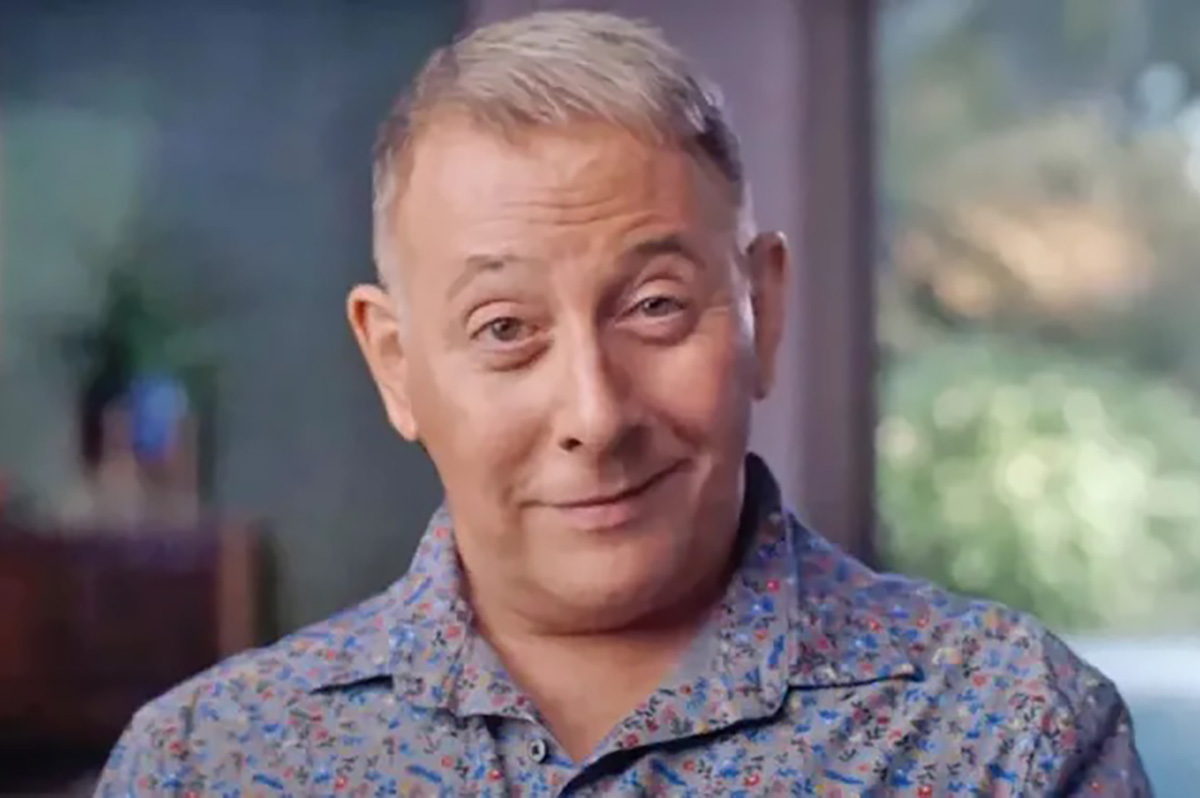
While Paul Reubens never publicly came out as gay before passing away in 2023, the two-part documentary “Pee-wee as Himself” premiered back in May on HBO Max, giving the legendary comedian a chance to posthumously open up to the world. Directed by Matt Wolf, the documentary explores how Reubens found his alter ego Pee-Wee Herman and why he kept his private life private.
The documentary won an Emmy in the Outstanding Documentary or Nonfiction Special category and remains one of the most critically acclaimed titles of the year with a 100% Rotten Tomatoes score. Also worth noting, the National Geographic documentary Sally told the posthumous coming out story of Sally Ride through the help of her long-time partner, Tam O’Shaughnessy.
5. Lady Gaga releases ‘Mayhem’
Lady Gaga entered a new phase of her musical career with the release of Mayhem, her seventh album to date. From the frenzy-inducing pop hit Abracadabra to the memorable Bruno Mars duet featured on “Die With a Smile,” seeing Gaga return to her roots and make an album for the most die-hard of fans was especially rewarding after the underwhelming film releases of “House of Gucci” and “Joker: Folie à Deux.” Gaga has been touring with The Mayhem Ball since July, her first arena tour since 2018. She even extended her tour into 2026 with more North American dates, so the party isn’t stopping anytime soon. And Gaga is even set to make an appearance next May in “The Devil Wears Prada 2.”
4. Cynthia Erivo, Ariana Grande perform at the Oscars
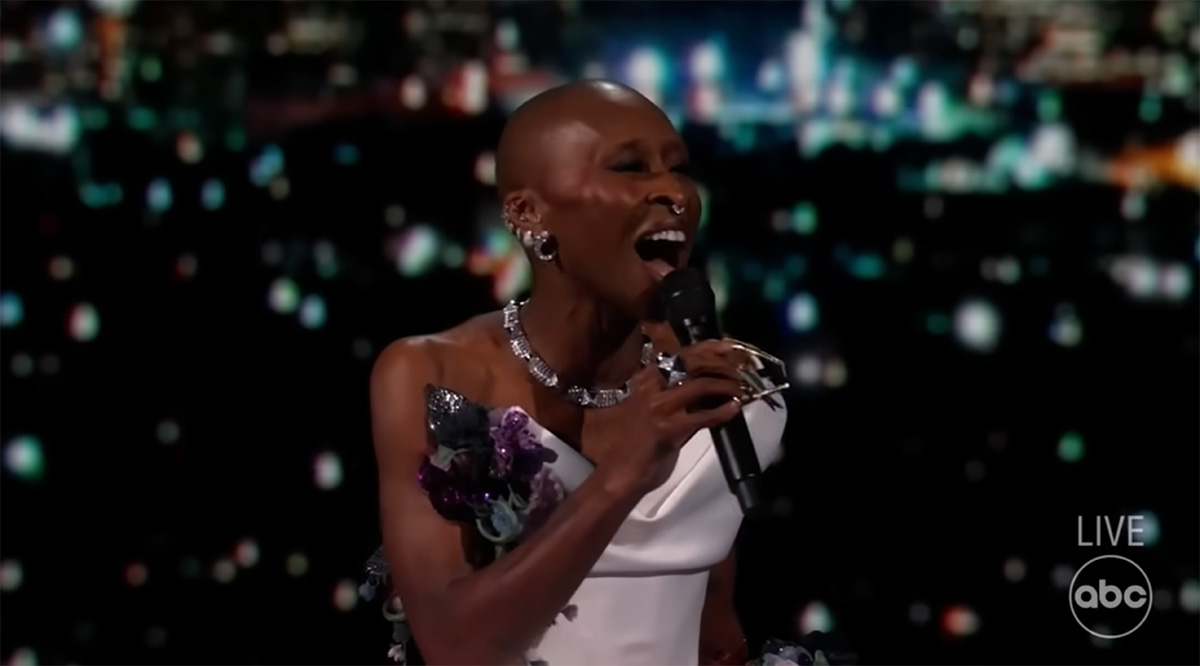
While “Wicked: For Good” didn’t quite reach the heights of the first film, we will forever have Cynthia Erivo and Ariana Grande’s breathtaking live performance that opened the 97th Academy Awards. The pair sang a rendition of “Over the Rainbow,” “Home,” and “Defying Gravity,” paying proper homage to the original 1939 “Wizard of Oz.” Even non-Wicked fans can’t deny how magical and brilliantly staged this performance was. With both Erivo and Grande up for acting Oscars last year, they’re hoping to repeat success and make history with consecutive nominations. Either way, let’s hope there’s another live performance in the making, especially with two new original songs (The Girl in the Bubble and No Place Like Home) in the mix.
3. Indya Moore speaks out against Ryan Murphy
Indya Moore has consistently used social media as a platform for activism, and in September, posted a 30-minute Instagram live speaking out against “Pose” co-creator Ryan Murphy. Moore claimed that Murphy wasn’t being a true activist for trans people. “Ryan Murphy, we need you to do more. You need to address the racism, the violence, and the targeting of people on your productions, Ryan Murphy. You do need to make sure trans people are paid equally. Yes, Janet did the right thing,” Moore said. Murphy was also back in the headlines this year for the critically panned “All’s Fair” and the controversial “Monster: The Ed Gein Story” starring Laurie Metcalf and Charlie Hunnam.
2. Cole Escola wins Tony for Best Leading Actor
Few pop culture moments this year brought us together more than Cole Escola winning a Tony award for “Oh, Mary!” the Broadway show they created, wrote and starred in (we love a triple threat!) Escola made history by becoming the first nonbinary person to win a Tony in the leading actor category, and seeing them excitedly rush to the stage wearing a Bernadette Peters-inspired gown instantly became a viral social media moment.
The cherry on top of Escola’s major moment is the recent news that they are writing a Miss Piggy movie with Jennifer Lawrence and Emma Stone producing — news that also broke the internet for the better. We cannot wait!
1. Jonathan Bailey makes gay history as ‘Sexiest Man Alive’
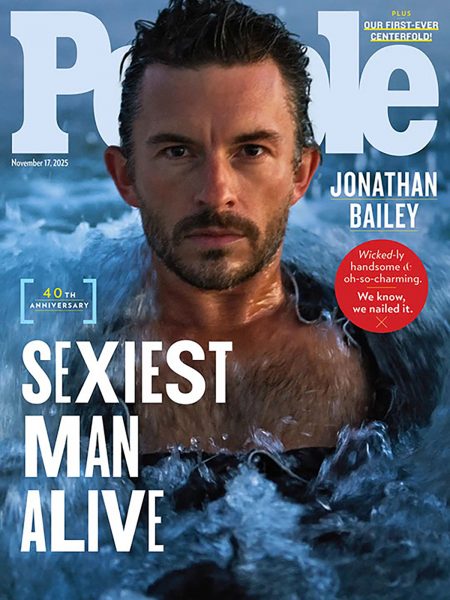
The same year as his on-screen roles in blockbusters “Jurassic World Rebirth” and “Wicked: For Good,” Jonathan Bailey made history as the first openly gay man to be named People magazine’s “Sexiest Man Alive.” The fact that it took 40 years for an openly gay man to earn the title is a signifier of how far we still have to go with queer representation, and seeing Bailey celebrated is just one small step in the right direction.
“There’s so many people that want to do brilliant stuff who feel like they can’t,” he told PEOPLE, “and I know the LGBT sector is under immense threat at the moment. So it’s been amazing to meet people who have the expertise and see potential that I could have only dreamed of.” In 2024, Bailey founded the charity titled The Shameless Fund, which raises money for LGBTQ+ organizations.
-

 Iran5 days ago
Iran5 days agoGrenell: ‘Real hope’ for gay rights in Iran as result of nationwide protests
-

 Congress5 days ago
Congress5 days agoVan Hollen speaks at ‘ICE Out for Good’ protest in D.C.
-

 Virginia5 days ago
Virginia5 days agoMark Levine loses race to succeed Adam Ebbin in ‘firehouse’ Democratic primary
-

 LGBTQ Non-Profit Organizations5 days ago
LGBTQ Non-Profit Organizations5 days agoNational LGBTQ Task Force brings Creating Change conference back to D.C.



